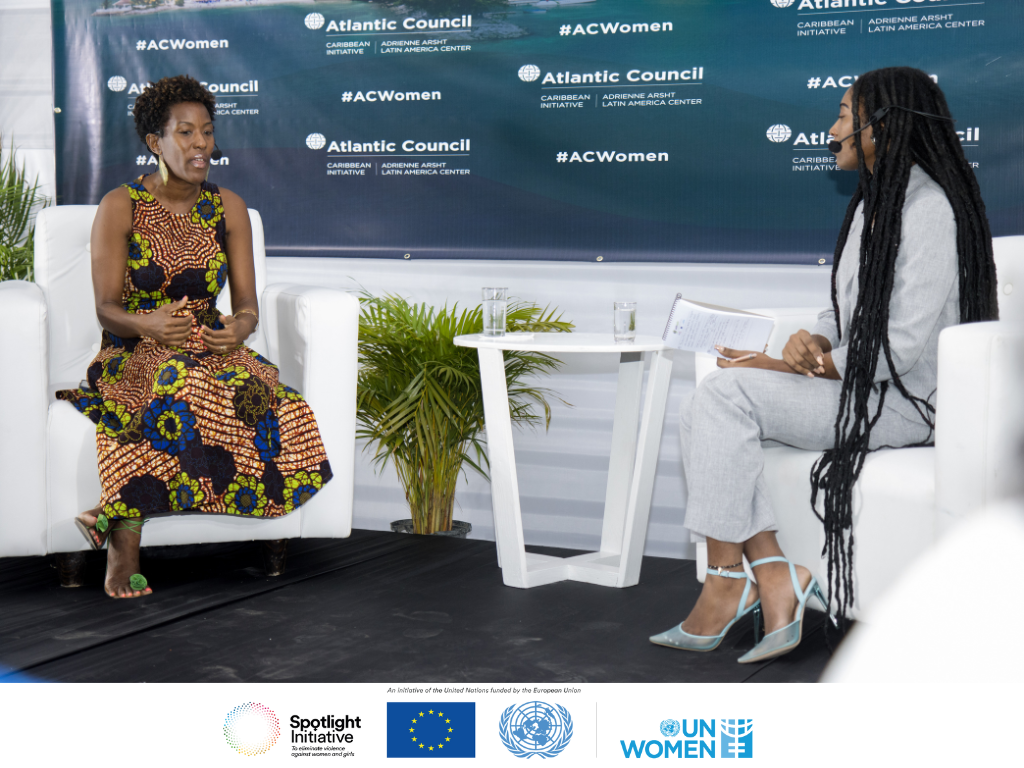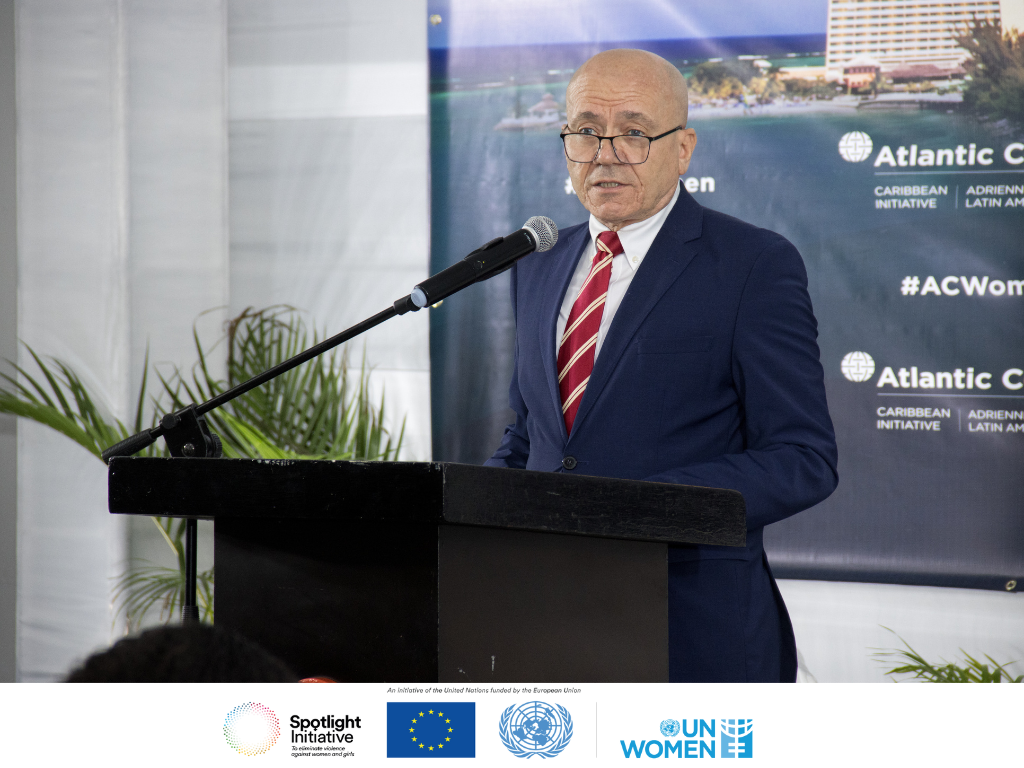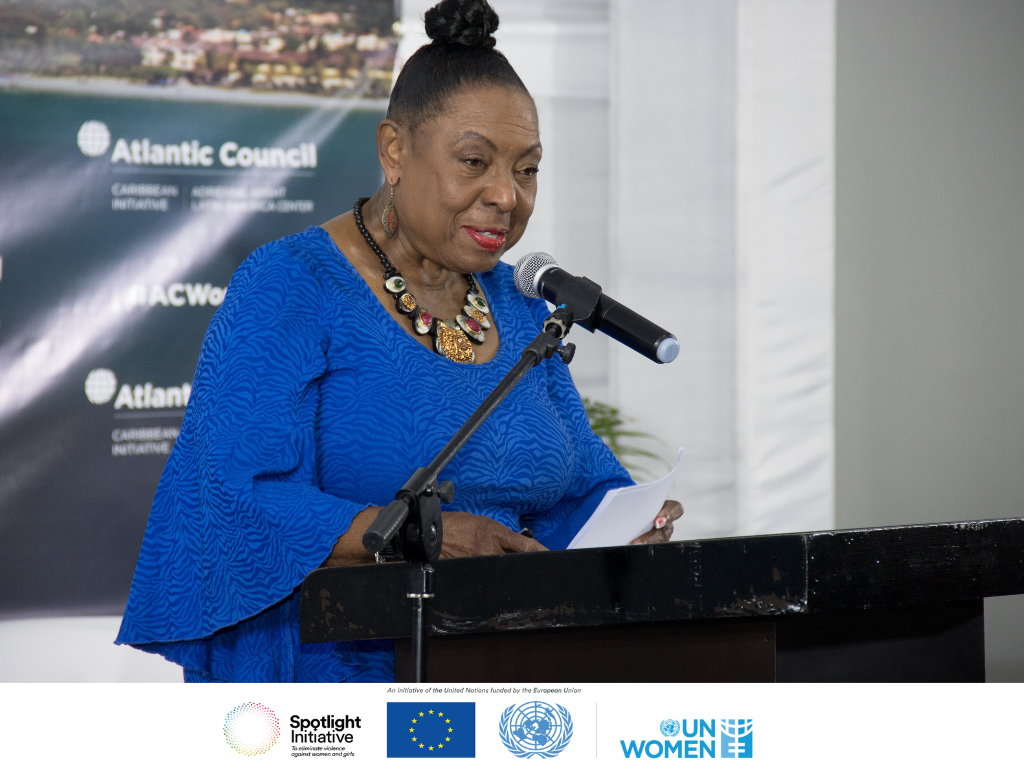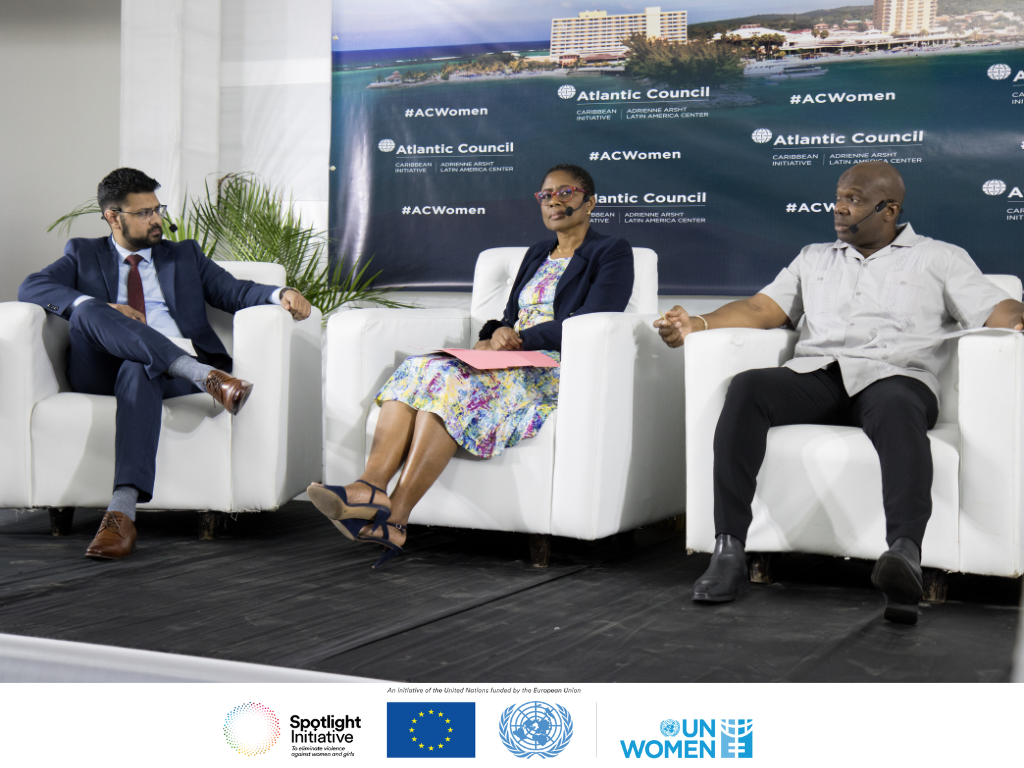Jamaica Private Sector Key Player in Women’s Empowerment
Date:
October 5, Kingston, Jamaica: The estimated USD1 billion or 6.49% of the 2018 Gross Domestic Product (GDP) that Violence Against Women and Girls (VAWG) costs Jamaica, necessitates that the private sector sees itself too, as a critical player in women’s economic and overall empowerment.
Representative, UN Women Multi-Country Office - Caribbean, Tonni Brodber made the link between economic empowerment and ending violence against women and girls during a fireside chat at the recently concluded, Advancing Caribbean Development through Women’s Empowerment Conference.
Ms. Brodber said, “It is an economic issue. It is a human issue. It is a sustainable development issue. If women do not have the tools to make certain decisions, they will feel they cannot leave certain situations and so it is an economic issue. Not only is it costing the government of Jamaica but it is also costing individuals, their potential to fully serve their country.”
VAWG survivors are sometimes unable to attend work (miss work); it means that their duties at work are not attended to, resulting in lost productivity and by extension losses to the GDP. Examining the economy-wide costs related to VAWG by sector, showed that the services sector was most impacted with an estimated USD 180.6 million in output losses (1.27% of GDP). The industry sector follows with an estimated USD 140.4 million in output losses (0.99 per cent of the 2018 GDP)1.

Representative, UN Women Multi-Country Office – Caribbean, Tonni Brodber speaks with Christina Williams, Chairwoman, Human Rights Council, Norman Manley Law School during a fireside chat at the recently concluded, “Advancing Caribbean Development through Women’s Empowerment Conference”.
UN Women Photo/Dorian Smith
Under the EU-UN Spotlight Initiative, UN Women implementing partner Atlantic Council brought together UN agencies, Government officials from several departments, civil society representatives, academics and students to discuss the challenges and opportunities around ending GBV and enhancing women’s economic empowerment.
Data from UN Women Caribbean shows that 39% of women in Jamaica have experienced some form of violence and on average across the region, at least 46% of women have experienced at least one form of violence in her lifetime. Brodber told the audience that the cost of GBV is “expensive” and availability and access to data are important to understand the prevalence of GBV and its impacts on economies. She shared that data, which is a readily available resource at UN Women, empowers government representatives to make a case for national policies and laws, and changes the debate on GBV.
Head of Cooperation, Delegation of the EU to Jamaica, Aniceto Rodriguez Ruiz in delivering welcome remarks said: “Gender equality is a core value of the EU and a universally recognised human right but it’s not just that. It is also imperative to economic growth, to prosperity, good governance, to peace and security.”
Mr. Ruiz added: “The EU is therefore committed to eliminating all forms of violence against women and girls. In fact, empowering women and girls is not only the right thing to do, it is the smart thing to do. It’s a human thing to do.”

Aniceto Rodriguez Ruiz, Head of Cooperation, Delegation of the EU to Jamaica, delivers the welcome remarks. UN Women Photo/Dorian Smith

Honourable Olivia Grange, Minister of Culture, Gender, Entertainment and Sport, Jamaica delivers the keynote address.
Honourable Olivia Grange, Minister of Culture, Gender, Entertainment and Sport said the Government of Jamaica is committed to “doubling down” on strategies to empower women and achieve gender equality. She stressed that attaining Sustainable Development Goal (SDG) 5: Gender Equality, is key to achieving all 17 SDGs and is a priority of the Government of Jamaica.
Stressing the need for gender-responsive budgeting in the region, Minister Grange said, “In order to more appropriately respond to the differing needs of not only our women and girls but all citizens as a whole, public budgets should integrate commitments towards achieving gender equality. This is necessary to not only adequately address the differing needs of citizens, but also to assist in avoiding the further exacerbation of existing gender inequalities.”
Minister Grange also stressed the importance of the UN Women-commissioned, “National Study on the Economic Cost of Violence Against Women and Girls in Jamaica” in partnership with the Ministry of Culture, Gender, Entertainment and Sport under the frame of the EU-UN Spotlight Initiative, as an action geared towards realising a gender-sensitive public budget.
The Minister said that the study, “highlights the importance of ending violence against women and girls with the support of legislation as well as plans and programmes. In addition, the study also highlights the need to allocate budgetary support to fund initiatives to provide essential services to affected women and children. I have no doubt that all of us will be able to achieve even more once we receive the appropriate funding to do so.”
In December 2022, the House of Representatives approved a motion to establish a Caucus of Women Parliamentarians to bolster women in political representation. UN Women Caribbean provided technical support to the women members of Parliament through women’s leadership initiatives under the EU-UN Spotlight Jamaica programme, whereby the Caucus was proposed.
The Minister said the bi-cameral caucus will, “create a sustainable medium where women Parliamentarians can unite to strengthen solidarity and women’s representation and leadership in politics […]. We ensured that it (the caucus) was institutionalised in Parliament where we were able to get it to be a sessional committee. Additionally, the caucus can be used to provide essential information and training for women Parliamentarians, and also to mainstream gender in Parliamentary Institutions and Procedures.
The business sector, civil society and government officials were also well-represented at the conference participating in panel discussions examining the root causes of GBV and the potential for women’s economic inclusion to the growth trajectory of the Caribbean.

Panellists Nadine Heywood, Vice President, Credit Solutions: Programme Lead for Women’s Initiative Scotiabank (Centre); and Dr. Lauren Marsh, Head of Department, Hugh Shearer Labour Studies Institute, University of the West Indies (Right) discuss women’s economic inclusion. Looking on is Moderator, Wazim Mowla- Associate Director, Caribbean Initiative, Adrienne Arsht Latin America Center, Atlantic Council (Left).
Under the Spotlight Initiative, UN Women implementing partner Atlantic Council will host a similar private sector engagement in Guyana in November, 2023.